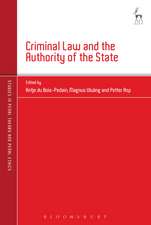Hegemonic Individualism and Subversive Stories in Capital Mitigation
Autor Ross Kleinstuberen Limba Engleză Hardback – 22 mai 2014
Preț: 699.01 lei
Preț vechi: 822.36 lei
-15% Nou
Puncte Express: 1049
Preț estimativ în valută:
133.78€ • 139.30$ • 113.06£
133.78€ • 139.30$ • 113.06£
Carte tipărită la comandă
Livrare economică 10-24 martie
Preluare comenzi: 021 569.72.76
Specificații
ISBN-13: 9781472425591
ISBN-10: 1472425596
Pagini: 184
Dimensiuni: 156 x 234 x 13 mm
Greutate: 0.48 kg
Ediția:Revised.
Editura: Taylor & Francis
Colecția Routledge
Locul publicării:Oxford, United Kingdom
ISBN-10: 1472425596
Pagini: 184
Dimensiuni: 156 x 234 x 13 mm
Greutate: 0.48 kg
Ediția:Revised.
Editura: Taylor & Francis
Colecția Routledge
Locul publicării:Oxford, United Kingdom
Notă biografică
Ross Kleinstuber is an Assistant Professor of Justice Administration and Criminology at the University of Pittsburgh at Johnstown, USA. His current research interests include law and society, capital sentencing, genocide and international law, criminological theory, and individualism and inequality. Recent publications include studies of the role of individualism in judge and jury decision making and of the impact of hybrid sentencing statutes on capital juror behavior.
Recenzii
’This book is a clear, evidence based demonstration of how the emphasis on individualism in the United States undermines the appreciation of social influences on behavior presented in death penalty cases, and raises important questions about the capital punishment process and the resistance to addressing structural social problems.’ Wanda D. Foglia, Rowan University, USA ’This compelling book analyzes how widely-shared assumptions about individualism undermine the consideration of mitigation in capital trials. Drawing on court transcripts, juror interviews, and judicial sentencing opinions in death penalty trials, Professor Kleinstuber persuasively documents the myriad ways in which ideas about individual responsibility lead judges, jurors and attorneys to discount a defendant’s life history, family and economic risk factors, and other mitigation evidence. This book will be of great interest to students, scholars, attorneys, and all who care about ensuring fairness in the justice system. Highly recommended!’ Valerie P. Hans, Cornell Law School, USA and co-author of American Juries: The Verdict ’Kleinstuber's analysis of the death penalty in Delaware is timely, informative and sobering. Drawing upon the research procedures of the Capital Jury Project, Kleinstuber presents findings from transcript reviews, face-to-face interviews with jurors and, unique to the Delaware component of the Project, judges' sentencing orders. This triangulation of data provides a consistent and ultimately reinforcing picture of how life or death decisions are made. More often than not, the primary consideration is couched in terms of the crime, what the defendant did, with little mention of the lived experiences that brought him to the scene of the crime. This approach calls into question whether these life or death decisions take into account the frailties of humankind that, according the US Supreme Court, are to serve as the basis of a reasoned moral punishment dec
Cuprins
Chapter 1 Introduction; Chapter 1a Individualism and Capital Sentencing: What We Know and What We Hope to Learn; Chapter 2 Hegemonic Tales of Individual Responsibility in Capital Mitigation; Chapter 3 Subversive Stories in Capital Mitigation; Chapter 4 'œYou Still Don't Kill Somebody': Hegemonic Individualism and Jurors' Sentencing Recommendations; Chapter 5 'A Premeditated Intent to Kill': Hegemonic Tales in Judicial Sentencing Opinions; Chapter 7 Conclusion;
Descriere
This book offers an in-depth sociological examination of the use of individualizing and contextualizing accounts throughout the entire mitigation process of capital sentencing. The studies are based on cases presented by capital defense attorneys and experts from trials in Delaware and illuminate the challenges involved in structuring a death penalty that is not arbitrary in a culture that is overwhelmed by individualizing discourses and thus struggles to account for the entrenched racial and economic inequality that is so conducive to lethal violence.
















